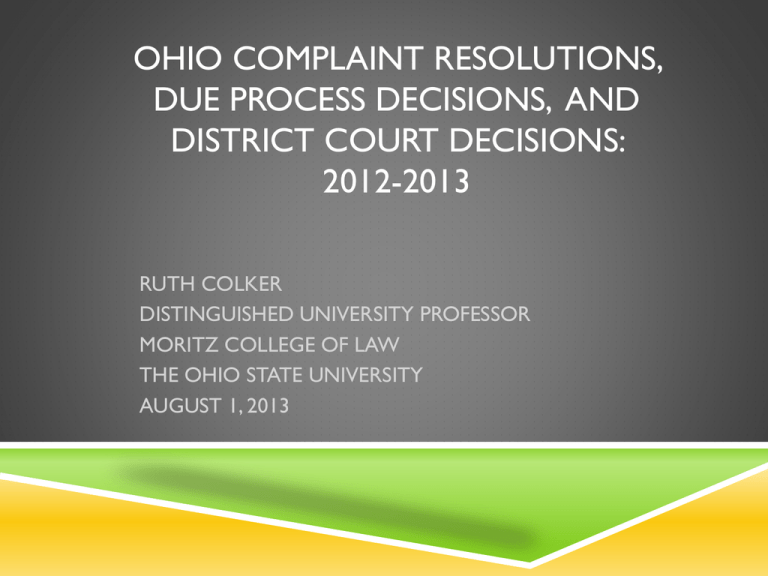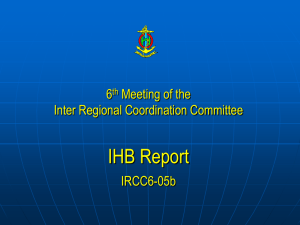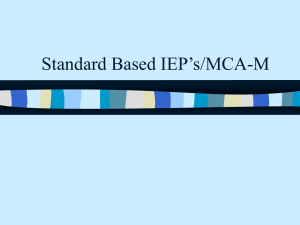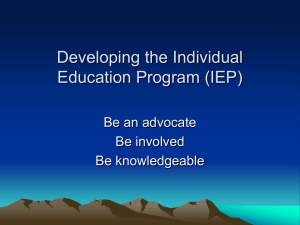August 1st CLE - Moritz College of Law
advertisement

OHIO COMPLAINT RESOLUTIONS, DUE PROCESS DECISIONS, AND DISTRICT COURT DECISIONS: 2012-2013 RUTH COLKER DISTINGUISHED UNIVERSITY PROFESSOR MORITZ COLLEGE OF LAW THE OHIO STATE UNIVERSITY AUGUST 1, 2013 OVERVIEW TOPICS: COMPLAINT RESOLUTIONS DUE PROCESS DECISIONS DISTRICT COURT REVERSALS THEMES BLAME THE MOTHER STINGY RELIEF ERRORS BY HEARING OFFICERS BETTER RESOLUTIONS BY COMPLAINT INVESTIGATORS WITH NOTABLE EXCEPTIONS OVERVIEW OF COMPLAINT RESOLUTIONS May 2012 to May 2013: 81 Complaints 51 Pro-parent/student (63 %) 30 Pro-district (37 %) Significant variation by investigator and by school district SORTED BY INVESTIGATOR Laughlin: 11 complaints (82 % success rate) 9 pro-parent/student: Cincinnati, Wilmington, Toledo, Hilliard (3), Bright Local, Allen East, Brunswick 2 pro-district: Warren Local, Cleveland Cline: 21 complaints (52 % success rate) 11 pro-parent/student: Willoughby, Toledo, Chagrin Falls, Westerville, E. Muskingum, Heir Force, Cincinnati(2), Batavia, Meigs Local, Richmond Heights 10 pro-district: Columbus (3), Winton Woods, Cincinnati (4), Wilmington, Hillsdale Bockrath: 4 complaints (75 % success rate) 3 pro-parent/student: Barberton, Newbury Local, Martins Ferry 1 pro-district: Rocky River Petrasek: 4 complaints (50 % success rate) 2 pro-parent/student: Ohio Virtual Academy, Danbury 2 pro-district: Canton, Lima Drvota: 19 complaints (74 % success rate) 14 pro-parent/student: Twinsburg, Columbus Preparatory Academy, Norwood, Bethel, Finneytown, Strongsville, Toledo, Lockland, E. Muskingham, St. Mary’s, Brookville, Cincinnati, Columbus, Parma 5 pro-district: Springfield, Strongsville, Pickerington, Hamilton, Boardman Rensch (2 with Sharabi): 22 complaints (54.5 % success rate) 12 pro-parent/student: Columbus(3), Focus Learning Academy, Shaker Heights, North Canton, Solon, Steps Center for Excellence in Autism, Newbury, Par Excellence Academy, Evergreen, Olmsted Falls 10 pro-district: Worthington, Columbus, Focus Learning Academy (2), Switzerland, Solon (3), Dublin, Autism Academy EXAMPLES OF SUCCESSFUL ISSUES IN COMPLAINTS 1. Who is in attendance at IEP meetings 2. Lack of parent communication/progress reports 3. Poor scheduling of meetings with Parents 4. Poorly Written IEPs 5. Failing to have continuum of alternative placements 6. Improper use of seclusion and restraint 7. Obligations of community schools 8. Failing to conduct evaluations/child find WHO SHOULD BE IN ATTENDANCE AT IEP MEETINGS CP 0048-2012 (Cincinnati)(Laughlin): Need to have at least one regular education teacher if child is participating in the regular education environment Must have a District representative who is knowledgeable about the availability of resources for the District. Must be able to authorize services. Parent must be provided an opportunity to participate. (Can’t have another group, without parent, make determination after the meeting.) CP 0168-2012(Hilliard)(Laughlin) But parent found to have consented to certain individuals being absent from meeting. CP 0158-2012 (Bright Local)(Laughlin) Parent requested attendance of science teacher. Facilitated IEP meeting with new science goal. CP 0043-2013 (Columbus)(Drvota) No one present to interpret speech results Moving from ETR to IEP procedurally defective because of lack of notice to parent of an IEP meeting. PARENT COMMUNICATION CP 0045-2012 (Twinsburg)(Drvota): IEP specified would call parent if grades worsened. Otherwise, just expected parent to check parent portal available to all students. CP 0048-2012(Laughlin)(Cincinnati) Poor communication because drafts not labeled as drafts. One IEP not even signed. School district not clear about which meetings are “IEP meetings.” CP 0064-2012(Norwood)(Drvota) Called parent the morning of the manifestation meeting. Inadequate notice. Progress reports placed in student’s backpack. Mailing communications more effective. CP 0046-2012(Willoughby-Eastlake)(Cline) One of many examples of school district not providing prior written notice. A PWN is required when school district denies request to classify child as disabled. SCHEDULING OF MEETINGS CP 0091-2012(Winton Woods)(Cline) One of many examples of parent not being able to attend MFE or IEP meeting because couldn’t be scheduled within required time limits. Parent may have sought postponement for various reasons including finding an advocate to assist. Ohio does not always find a violation but recent 9th Circuit case suggests that meeting should be rescheduled at parent’s request rather than be held without parent. See Doug C. v. State of Hawaii Dept of Education, No. 12-15079 (9th Cir. June 13, 2013). CP 0020-2013 (Cincinnati)(Cline) Ninth grade boy in foster care. Need to invite mother or grandmother to meetings. POORLY WRITTEN IEPs CP 0098-2012 (Strongsville)(Drvota) Good example of ridiculously inadequate IEP (that parent consented to, initially). Tries to solve student’s organizational problems by merely requiring student to take personal responsibility for being organized. CP 0150-2012(Newbury)(Bockrath) District used generic forms that had no data for specific student. No progress reports. CP 0168-2012(Hilliard)(Laughlin) Annual goals were too vague. For example, original IEP said “Given a writing prompt, student will write a response in a complete sentence.” 75 % mastery. New IEP said: “Given a writing prompt of a familiar subject, student will independently write a response of 1-4 sentences using correct spelling, capitalization, punctuation, form and proper word spacing.” CP 0173-2012(Hilliard)(Laughlin) Annual goals were too general. For example, original IEP said “Student will demonstrate understanding and use of language. 80 % mastery.” New IEP said: “The student will verbally state grammatically correct sentences to define, describe, and express herself with details in the therapy setting.” CP 0231-2012(Heir Force Community School)(Cline) Criticizes lack of effective behavior plan. Just sends child home. CP 0170-2012 (Westerville)(Cline) Failed to develop FBA on a timely basis. INADEQUATE INTERVENTION CP 0153-2012 (Hilliard)(Laughlin) When student had attendance issues, school offered intervention of a shortened school day, alternative school program, and home instruction when student failed to attend. Private psychologist made suggestions that were ignored. When student transferred to Middle School B, no evidence of any interventions. Only responsibility fell to parent -"parent agrees to implement more tools to help the student not get overwhelmed and work with counselors on a treatment plan.” After transferred to school B, the parent withdrew the student from the district to attend an online school. Student was allegedly a victim of bullying, which State said should be resolved under Section 504 with a complaint to OCR. CP 0246-2012 (East Muskingum)(Cline) Inadequate IEP without measurable goals or clear roles for professionals. District provided ESY to no students! CP 0196-2012 (Newbury Local)(Rensch) Older student did not like reading “baby books.” Reading materials should be high interest – low vocabulary so that student is ensured of having access to general curriculum. CP 0038-2013 (Meigs)(Cline) Goals very general, such as “student will develop, practice and use strategies to answer comprehension questions.” FAILURE TO HAVE CONTINUUM OF PLACEMENTS CP 0168-2012(Hilliard)(Laughlin) Investigator found that placement decision was based on student’s disability rather than the unique needs of the student. But not chided for unnecessary delays despite citation to Musgrove letter. Parent found to have consented to certain individuals being absent from meeting. Parent not able to have child receive services while contested placement even though that is parent’s clear intent. SECLUSION AND RESTRAINT CP 0231-2012(Heir Force Community School)(Cline) Very very strong findings criticizing a community school’s use of restraint But contrast with Columbus complaint (CP 0203-2012)(Cline) CP 0231-2012 (HEIR FORCE COMMUNITY SCHOOL)(CHRISTINE CLINE) Student was only in first grade but being subject to restraint frequently. Parents were told that expulsion would result in the student's inability to enroll in any other school in the state. On the day the student could have been suspended for an eleventh day, and the school was required to conduct a manifestation determination, the parents withdrew the student from the school. When the parents tried to rescind the withdrawal, the school stated that "classroom limits had been reached." Investigation also found that school frequently called child's parents or grandparents and had them pick up child early. OEC found that "having students leave during the school day because of their behavior could count as days of suspension under certain circumstances. Further not providing specially designed instruction to meet the unique needs of the student could also constitute a denial of FAPE." Also found that inclusion setting may not have been LRE. "The third extremely serious concern involves the practice adopted by several staff members at the school of restraining this student frequently and having one person carry the student to the office or other locations when he refused to move." Documented a teacher noting that he or she actually sat on the student's chest which investigator describes as "potentially lethal." Complaint filed with Children's Services over alleged abuse of child. OBLIGATIONS OF COMMUNITY SCHOOLS CP 0231-2012 (Heir Force Community School)(Cline) Very strong language about obligation of community schools to educate children rather than force them to withdraw CP 0030-2013 (Par Excellence Academy) (Rensch) Did not properly prepare IEP and did not have sufficient placement options. DELAY IN EVALUATING STUDENT CP 0016-2013 (Cincinnati)(Cline) School District used FBA and BSP to delay student’s evaluation for nearly one year without providing data that demonstrated that the BSP was providing an educational benefit to the student. In contrast to CP 0182-2012 (Cline)(Columbus City Schools) In contrast to CP 0168-2012 (Laughlin)(Hilliard School District) CP 0023-2013 (Brookville)(Drvota) District insisted that could not evaluate until tried interventions for 6 to 8 weeks. CP 0230-2012 (Evergreen)(Rensch) District said it needed to conduct five weeks of interventions before evaluating child. Not found to have violated IDEA due to this fact (because other factors already caused it to be out of compliance) but was cautioned due to this fact. CP 0014-2013(Columbus)(Rensch) District used lack of attendance as excuse not to conduct evaluation. After complaint filed, agreed that poor attendance due, in part, to behavioral difficulties. OTHER ISSUES CP 0042-2012 (Ohio Virtual Academy)(Petrasek) Not equipped to provide specialized services CP 0049-2012 (Columbus Preparatory Academy)(Drvota) Inappropriate behavior plan and segregating behavior CP 0071-2012 (Toledo City Schools)(Cline) No evaluation until parent submitted complaint. Conducted evaluation without parent participation. CP 0083-2012 (Bethel Local School District)(Drvota) Filing complaint caused district to comply with closed captioning rules from IEP. CP 0056-2012 (Columbus)(Rensch) Filing complaint led to facilitated IEP meeting and manifestation determination that behavior was result of not following behavior plan. OTHER ISSUES CP 0121-2012 (Toledo)(Drvota) School district delayed IEP and then slow to change it after behavior worsened. CP 0141-2012 (Toledo)(Laughlin) Inappropriate behavior plan CP 0106-2012 (Lockland Local)(Drvota) IEP has insufficient behavior plan CP 0147-2012 (Wilmington)(Laughlin) Poor transition planning CP 0144-2012 (North Canton)(Rensch) District blamed parent for “effectively unilaterally removing the student from school” rather than acknowledging severity of student’s medical problems. CP 0056-2013 (Richmond Heights)(Cline) Parent paid for evaluation; little data to suggest that interventions suggested were implemented or effective SOMETIMES INVESTIGATOR FINDS OTHER ISSUES CP 0199-2012 (East Muskingum)(Drvota) Parent complained about way school district reported progress but investigator found no rule violated. Student did not receive some OT and compensatory services will be provided. Although not subject of complaint, investigator also found other problems such as opportunity to examine records, parent participation at meeting, PWN, definition of IEP -- progress reports specific to the goals and objectives. IHO AND SLRO OPINIONS 1. SE 2603-2011, SLRO 2603-2012 (pro-District) Procedural violations but no finding of substantive harm School district removed services to allegedly help student function more independently 2. SE 2609-2011, SLRO 2609-2011 (pro-District)(won’t discuss further) Longstanding dispute by parent whose child was sent to Educare District court cases under Horen v. Bd. of Educ. of City of Toledo Public School District 3. SE 2662-2012, SLRO 2662-2012 (pro-Student) Found no FAPE for two years but still ordered no compensatory education IHO tried to apply new Ohio seclusion rules before they had gone into effect 4. SE 2702-2012 (pro-District) Pro se parent who isn’t able to follow rules 5. SE 2802-2013 (pro-Student, in part) Blamed mother but provided some relief for being forced to home school 6. SE 2804-2013 (pro-District) Blamed mother Refuses to provide relief despite procedural violations SE 2603-2011, SLRO 2603-2012 (STRONGSVILLE CITY SCHOOL DISTRICT) (PRO-DISTRICT) Parents did not receive complete progress reporting regarding IEP vocational goals 4 and 5 over the course of the 2010-2011 school year. Parents also did not receive final reporting on student’s 2010-2011 IEP. Procedural violation but no finding of substantive harm. “I am reluctant to determine that a progress reporting error would ‘significantly impede’ a parent’s ability to participate in a student’s educational programming where the parents did not take reasonable steps to work through the claimed deficiency without litigation.” BUT, hearing officer orders district to provide missing reports to parents, as a remedy for procedural violations, pursuant to (k)(iii). Parents objected to IHO saying: “Petitioners must present evidence demonstrating that, no matter what information they were to provide the school district, the school district would be unwilling to consider alternatives.” (IHO, p. 21). The “no matter what” language was criticized. (SLRO at 10) SLRO found that parents take the “no matter what” language out of context. Other language shows a fuller consideration of the facts. SLRO: “The fact that the District independently made IEP decisions prior to the IEP team meeting is permitted under IDEA without amounting to a predetermination.” Found that IEP meeting was not a “sham.” (p. 14) One on one services removed allegedly to allow student to attain more independence despite no evidence that meaningful benefit could occur without one-on-one services IHO: “Meaningful benefit does not require that a Student master or even progress on every objective in an IEP – it is measured cumulatively …. Moreover, levels of progress must be judged with respect to the potential of the particular child.” (IHO, p. 32) SE 2662-2012, SLRO 2662-2012 (PRO-STUDENT) (GREEN LOCAL SCHOOL DISTRICT) (IHO RON ALEXANDER) 18 year old student with Prader-Willi Syndrome. School district used a “chill room” to control his behavior even though not on IEP. Parents unilaterally placed student at Latham Center and sought reimbursement. Favorable decision by IHO (Ronald Alexander) but 220 page opinion is riddled with typos and makes many clear legal errors. Also fails to provide parents with full relief despite strong findings. SE 2662-2012 (CONT.) Found decisions to place student in Chill Room to be “predetermined.” But Chill Room not even mentioned in IEP. Not clear what that even means. Found that school district should pay the cost of enrolling student at Latham Center but found he has “no authority” to award travel and transportation expenses. But IDEA clearly permits payment of travel and transportation. Is child supposed to walk there? Ordered relief beyond two year statute of limitations Referred to new Ohio rules about seclusion and restraint that had not yet gone into effect. Parents requested three additional years at Latham as compensatory award for no FAPE for three years. IHO found that request too mechanical so ordered NO compensatory award at all! SE 2662-2012: COMPENSATORY AWARDS Reid ex rel. Reid v. District of Columbia, 401 F.3d 516 (D.C. Cir. 2005) (case relied upon by IHO in this case, and often cited by Sixth Circuit) The decision by the hearing officer is supposed to be "a fact-specific exercise of discretion by either the district court or a hearing officer.” That decision can be overturned if it is "an abuse of discretion." An award of "zero" is an abuse of discretion!! The Reid court also said (with respect to the proposed hour per day formula): "we have no basis for concluding that 810 hours — barely more than half of a single academic year — would suffice to make up for Matthew's four-and-a-half years without FAPE, especially considering that during that period he developed 'counterproductive' reading habits." SLRO 2662-2012 (MONICA R. BOHLEN) Not appropriate to describe use of Chill Room as “seclusion”: “Courts have found that the purpose of placing a student in a ‘timeout’ serves the legitimate ends of modifying a student’s behavior without expelling him and preserving the rights and interests of other students in receiving an education.” (p. 44) No discussion of standards for compensatory awards. Cleaned up some of IHO’s errors but did not reverse reimbursement determination. SE 2802-2013 (BULLYING ISSUE) (PRO-STUDENT IN PART) (HUDSON CITY SCHOOL DISTRICT) (IHO TODD ANTHONY MAZZOLA) Students allegedly gave candy to students which was allegedly laced with drugs. Also gave her derogatory notes. Parents argued unsuccessfully that a school district’s deliberate indifference to or failure to take reasonable steps to prevent bullying of student with a disability can result in a denial of FAPE. School district cited ODE Case No. SE-2300-2009E for the proposition that allegations of bullying cannot be claimed as a violation of IDEIA. In that case, the IHO said: “The undersigned finds that since the assaults were not a concern under this student’s educational plan and since the assaults were not in any way a form of imposed discipline by the school or otherwise part of the school sanctioned educational plan, then the assaults cannot be found to have violated student’s rights under IDEIA. See Smith v. Port Hope School District (August 6, 2007), 2007 WL 2261419, No. 05-10267.” (Linda Warner, IHO) The cited case is from E.D. Michigan and the IDEA count was dismissed because amended complaint did not raise issue and they did not exhaust their IDEA procedural remedies. SE 2802-2013 (CHANGE IN PLACEMENT ISSUE) School district forced parents to educate student at home after school staff resigned who was assigned to student. Supposed to be temporary until student “will have an opportunity to display more appropriate and safe behavior in the school environment” but, of course, that is impossible if student is at home! IHO ruled for student but found that “staffing crisis was one largely created by Mother and her adversarial relationship with [ ] staff. The further crisis caused by abrupt resignation was a trickle-down effect from that original crisis.” (p. 38) SE 2804-2013 (PRO-DISTRICT) (WILMINGTON CITY SCHOOLS) (IHO LINDA R. WARNER) Student was already on a Section 504 plan. Mother sought child being placed on an IEP to avoid being placement at Alternative School for rest of year due to discipline problems. Expedited complaint. Impossible burden of proof: “[I]n order to meet the burden this parent must establish not only that this student should have been provided services under an IEP, but she must also prove that had the student been served under a properly drafted and implemented IEP the behavior which resulted in the suspensions or removals either would not have occurred at all, or if they would have occurred, the behaviors would have been or should have been determined to be a manifestation of the child’s disability.” (p. 31) This is another “blame the mother” case. SE 2804-2013 (CONT.) Unremedied procedural error: School conducted an ETR on February 17, 2011 and never reached a decision about whether student was eligible for services. Despite no ETR, “this hearing officer finds this student is not eligible for special education services.” (p. 24) “This IHO finds that there may very well have been a procedural violation involved in this matter by failing to timely reconvene and have team consensus report from the evaluation team, after the February 17, 2011 meeting. However, nothing in that procedural violation amounted to any substantive violation and therefore there was no harm.” (p. 44) Hard to see how District’s failure to reach a conclusion about disability status after ETR is harmless error in case whose sole issue is whether child should have been classified as disabled. DISTRICT COURT CASES Reversed IHO or SLRO: Gibson v. Forest Hills (transition services) P.C. v. Miford Exempted Village Schools (change in placement) Affirmed SLRO: Horen v. Toledo School District (Educare case) Hupp v. Switzerland of Ohio Local School District (FAPE issues; procedural errors but no substantive harm) T.J. v. Winton Woods School District (SLRO reversed IHO; district court affirmed SLRO)(same lawyer who brought P.C. v. Milford case) GIBSON V. FOREST HILLS (IHO) SE 2381-2009 (Forest Hills)(Tobie Braverman) Hearing officer blames parents for difficulties finding agreement with school. Father described as glaring at witnesses. Mother testified that school district personnel were liars, despicable and malicious. (p. 8) Nonetheless, parents did prevail on several grounds: Student shall be provided with an IEP goal designed to increase reading fluency Student shall be provided with an IEP designed to increase number and money skills Student shall be provided with an IEP goal designed to decrease prompt dependency Revised goals regarding bilateral hand coordination and maneuvering Compensatory education in the amount of 240 hours for reading and math instruction Procure an augmentative communication assessment “The inability to formulate and execute an IEP has been precipitated in substantial part by Petitioners’ conduct … As a result, the IHO cannot find, as requested, that Petitioners are the prevailing party herein.” (IHO, pp. 24-25) GIBSON V. FOREST HILLS (SLRO) SLR 2381-2009 (Forest Hills)(Monica R. Bohlen) Parents filed for due process regarding: 1. failure of IHO to award relief in areas of communication/assistive technology, transition and related services. 2. failure to order appropriate transition services. 3. failure to find lack of meaningful participation 4. failure to consider section 504 claims 5. failure to use correct standard in determining prevailing party status, and 6. failing to order two years of compensatory education Parents lost on all claims. (There were no cross-appeals by school district.) I predicted at last year’s session that SLRO would be reversed on appeal. GIBSON V. FOREST HILLS LOCAL SCHOOL DISTRICT, BOARD OF EDUCATION, 2012 WL 1197896 (APRIL 10, 2012 S.D. OHIO) Even though school district had not filed a cross-appeal before SLRO, it filed an action in federal court challenging relief that was ordered by IHO. Gibsons moved to have that case dismissed because school district had not exhausted state administrative proceedings. Federal district court granted dismissal. GIBSON V. FOREST HILLS SCHOOL DISTRICT BOARD OF EDUCATION, NO. 1:11-CV-00329 (S.D. OHIO JUNE 11, 2013) Parents prevailed on claim 2 (of 6 claims): Transition services Chloe turned sixteen in December 2007 and was not invited to any IEP meetings even though the Federal and State regulations state that a school district “must invite” the student to IEP team meetings when postsecondary goals will be discussed. This procedural violation would not result in substantive harm if the school district took other steps to ensure that Chloe’s preferences and interests were considered. That did not occur here. Court concludes that Forest Hills failed to properly develop transition services. It also concluded it did not have sufficient information to determine an appropriate remedy. Must meet with the parties to discuss how to proceed as to the remedy. (p. 28) Parties agreed to hold the prevailing party and attorney fees issues in abeyance until the resolution of the substantive issues. P.C.V. MILFORD EXEMPTED VILLAGE SCHOOLS (IHO) SE 2472-2010 (Milford Exempted Village Schools)(Braverman) Student had been receiving reading services from private placement at Langsford Center using LindamoodBell methodology for many years. School district wanted to move student to Milford Public School. Had reached a mediated settlement previous year. In 2010, District filed for Due Process when parent refused to consent to change in placement. IHO ruled for District: IHO found that Langsford Center “has not provided student meaningful educational benefit over its four years of use to demonstrate that it warrants continued instruction in a more restricted environment than that which will be provided by Petitioner’s proposed placement at Student’s school.” (IHO, p. 9) Even though IHO agreed that school district intended to eliminate reading services at the Langsford Center, IHO found there was no predetermination. It “demonstrates nothing more than the fact that this disagreement was ongoing and had not been resolved to Petitioner’s satisfaction.” (IHO, p. 13) P.C.V. MILFORD EXEMPTED VILLAGE SCHOOLS (SLRO) SLR 2472-2010 (Milford Exempted Village Schools)(Mues) “[T]his SLRO does not find that the IHO in her decision indicates that the Lindamood-Bell reading program is clearly not appropriate, only that the amount of success achieved in the program has not been so significant to warrant continued use when School District can offer a reading program in a less restrictive environment.” (SLRO, p. 6) Affirmed IHO. Not clear what it means for District to have Burden of Proof. Why can District change placement without showing that current placement is inappropriate? P.C.V. MILFORD EXEMPTED VILLAGE SCHOOLS, 2013 WL 209478 (S.D. OHIO JAN. 17, 2013) The district court found that Milford predetermined R.C.’s change of placement. Many discussions among school personnel occurred prior to IEP meeting in which they expressed determination to move R.C. back to Milford, even before deciding what reading program would be used. “[T]he record here shows that officials went beyond forming opinions and, instead, became impermissibly and deeply wedded to a single course of action: that R.C. not continue at Longsford.” (slip op. at *7) “R.C.’s teacher Donna Roberts testified that Milford was prepared to ‘go the whole distance this year which means the [parents] will be forced into due process.’” (slip op. at *6) “Here, the preponderance of the evidence shows that Defendant first decided to withdraw R.C. from Langsford and then began to decide on what goals to pursue and which methodologies to try.” (slip op. at *9). Court declined to rule whether school district committed a substantive violation by proposing an IEP that does not confer a meaningful educational benefit. “[B]ecause the Court has already determined that Defendant committed a procedural violation that resulted in substantive harm denying Plaintiffs meaningful participation in the IEP development process, the Court need not decide whether Defendant’s proposed IEP amounted to a substantive violation of the IDEA.” (slip op. at *10) District court declared parents to be the prevailing party and invited parents to submit a fee petition for reasonable attorney fees and expenses. OTHER NOTABLE CASES Alexander v. Lawrence County Board of Developmental Disabilities, 2012 WL 831769, No. 1:10-cv-697 (March 12, 2012 S.D. Ohio) (victory for parents) This is a civil action on defendants’ motion for judgment on the pleadings. Kim Alexander brought this case on behalf of her son, M.L., for violations of substantive and procedural due process, violation of equal protection, violation of section 504, negligence and/or gross negligence, and breach of contract. They had already entered into a settlement with defendants under IDEA. Lawyer for plaintiffs was Kenneth D. Myers (Cleveland). M.L. attended Open Door School, for children with multiple disabilities, from 2006 to 2010. Problematic behaviors escalated during that time. Plaintiff alleged that defendants “frequently physically restrained M.L. using a variety of techniques that included basket holds and prone restraints, which consisted of having as many as five employees ‘hold M.L. face down on the ground while’ sitting on him.” (slip op. at * 2). Also alleged that his education regressed while at ODS. By the time he left ODS at age fourteen, he could not read at a first grade level. This is an important case to establish right to compensatory and punitive damages for harm from physical restraint after exhausting IDEA remedies. OTHER NOTABLE CASES (CONT.) Galloway v. Chesapeake Union Exempted Village Schools Board of Education, 2012 WL 5268946, No. 1:11-cv-850 (Oct. 23, 2012, S.D. Ohio) (victory for parents) This is a civil action on defendants’ motions to dismiss. Joseph Galloway and his parents brought this action against the various defendants alleging that he was the victim of disabilitybased discrimination, harassment and bullying by teachers and students in the Chesapeake school system since 2005. Joseph turned 18 years old on September 25, 2011. For example: one teacher repeatedly questioned Joseph about his seizures in front of the entire class and questioned whether he really had seizures; students threw water on their pants to mock the fact that during seizures Joseph could become incontinent; students would call Joseph “seizure boy,” with the knowledge and approval of the teacher; a student destroyed a class project Joseph had constructed; students would move Joseph's belongings, hide his belongings, shove him, threaten to break his computer, steal his backpack, and damage his computer; a student pulled a chair out from behind Joseph; a student punched Joseph in the back; students encouraged Joseph to commit suicide; and the bullying culminated in several sexual assaults, in which students would come up behind Joseph in a locker room and grind their penises into Joseph's back. (slip op. at 1) This is an important case to establish right to damages for harm from disability- based bullying.These claims survived dismissal: Equal Protection against individual supervisory defendants and individual teachers Section 504 and ADA claims Title IX claim CONCLUSION These cases provide stark evidence of school districts writing entirely inadequate IEPs, blaming parents for children’s challenges, and use of entirely inappropriate seclusion and restraint Complaint process is sometimes helpful to remedy these glaring defects. IHO opinions reflect weak use of citation, heavy burden of proof on parents and light burden of proof on school districts with narrowest possible remedies District courts seem more hospitable to these claims than IHO’s but requires an endurance contest to get that far. What can we do to improve professionalism of IHO and SLRO opinions in Ohio?








